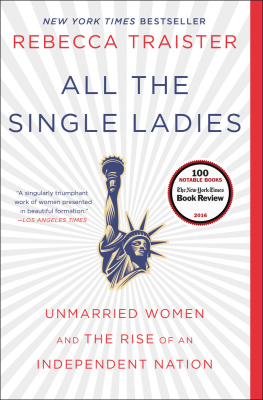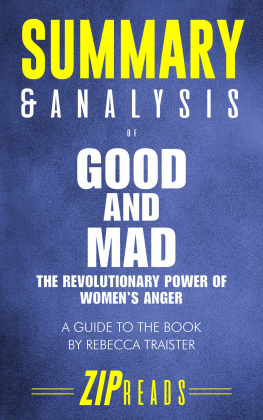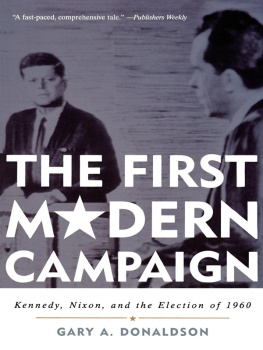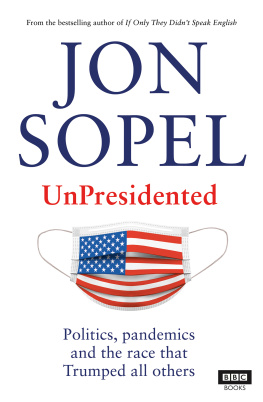Praise for Big Girls Dont Cry
I didnt know what I didnt know about the 2008 election until reading Rebecca Traisters smart, entertaining take on it. Well researched, well written, provocative and insightful, Big Girls Dont Cry is a high spirited salute to feminism in its many forms.
Curtis Sittenfeld, author of American Wife
In this riveting account of the 2008 election, Rebecca Traister negotiates the shoals of race and gender with exceptional grace and skill and establishes herself as one of the major younger journalists working today.
Katha Pollitt, poet, essayist and columnist for the Nation
Traister brings her elegant prose and unique perspectivethoroughly feminist but never doctrinaireto this absorbing personal exploration of the meaning of gender in the last election.
Ariel Levy, author of Female Chauvinist Pigs

Free Press
A Division of Simon & Schuster, Inc.
1230 Avenue of the Americas
New York, NY 10020
www.SimonandSchuster.com
Copyright 2010 by Rebecca Traister
All rights reserved, including the right to reproduce this book or portions
thereof in any form whatsoever. For information address Free Press Subsidiary
Rights Department, 1230 Avenue of the Americas, New York, NY 10020.
First Free Press hardcover edition September 2010
FREE PRESS and colophon are trademarks of Simon & Schuster, Inc.
For information about special discounts for bulk purchases,
please contact Simon & Schuster Special Sales at 1-866-506-1949
or business@simonandschuster.com.
The Simon & Schuster Speakers Bureau can bring authors to your live event.
For more information or to book an event, contact the Simon & Schuster
Speakers Bureau at 1-866-248-3049 or visit our website at www.simonspeakers.com.
Designed by Mspace/Maura Fadden Rosenthal
Manufactured in the United States of America
1 3 5 7 9 10 8 6 4 2
Library of Congress Cataloging-in-Publication Data
Traister, Rebecca.
Big girls dont cry : the election that changed everything
for American women / Rebecca Traister.
p. cm.
1. PresidentsUnited StatesElection2008. 2. Women in politics
United States. 3. WomenPolitical activityUnited States.
4. FeminismPolitical aspects. 5. Clinton, Hillary Rodham.
6. Palin, Sarah, 1964 7. Obama, Michelle, 1964 I. Title.
JK2762008 .T73 2010
324.973'0931dc22
2010009631
ISBN 978-1-4391-5028-3
ISBN 978-1-4391-5487-8 (ebook)
Obama Girl lyrics by Ben Relles and Leah Kauffman
For two women
born before the 19th Amendment:
Eleanor Howard,
who always voted for Republicans,
and Betty Traister,
who often voted (in protest) for her cat
CONTENTS
Yesterday, a beautiful day I was talking to [an older] woman who said that she wouldnt want to be me for anything in the world. She wouldnt want to live today and look ahead to what it is she sees because shes afraid. Fear is always with us but we just dont have time for it. Not now.
HILLARY RODHAM, Wellesley
commencement speech, 1969
The United States was said not to be ready to elect a Catholic to the Presidency when Al Smith ran in the 1920s. But Smiths nomination may have helped pave the way for the successful campaign John F. Kennedy waged in 1960. Who can tell? What I hope most is that now there will be others who will feel themselves as capable of running for high political office as any wealthy, good-looking white male.
SHIRLEY CHISHOLM, The Good Fight, 1973
I think we can all agree that its a great time to be a lady in America.
TINA FEY, Saturday Night Live, 2008
BIG
GIRLS
DONT
CRY
INTRODUCTION
THE FIRST TIME I entered a voting booth I was nine years old. It was 1984, and my parents had brought me with them so that I could pull the lever for the first woman ever to run on a major party ticket for vice president of the United States. I remember walking proudly with my father and mother and younger brother into the suburban Philadelphia firehouse five blocks from the house in which I grew up, where the poll watchers knew my parents by name because they were two of the very few registered Democrats in our district.
I remember the weight of the curtain closing behind me and my father lifting me up to turn the black lever to make the X appear next to Walter Mondales and Geraldine Ferraros names. I remember him putting me back down so that he could turn the buttons for the other Democrats, and then telling me to pull the rubber-covered metal bar back as hard as I could, until the machine made a clanging noise that meant my vote had been counted.
When we left the fire station my brother and I climbed into the back seat of our car and my mother turned to make sure our seat belts were fastened; my father looked at us through the rearview mirror. I hope that someday youll have the chance to vote for a woman at the top of a presidential ticket, he said before starting the car and driving us home.
Almost twenty-four years later, on Super Tuesday in February 2008, I walked into a cavernous school gymnasium in Brooklyn to cast my primary vote on Super Tuesday, for the first time in my voting life unsure of which lever to turn. It was the moment that could bring me closest to fulfilling my fathers wish: I could put the X next to the name of a woman and bring her closer to the top spot on the Democratic ticket. But I had spent months saying that I would never vote for her, that she was not my kind of candidate, not my kind of woman. Even though I was beginning to change my mind, my distaste for her felt entrenched, and perhaps self-defining.
I spent fifteen minutes behind the curtain, shoving levers back and forth. I considered the other name on the ballot, a man who was also not exactly my kind of candidate, but whose potential place at the top of the Democratic ticket would put him close to becoming the first African American president, a possibility just as thrilling as that of electing a woman. I wished that I didnt have to choose between them. I wished that I could vote for them both. I wished that I could vote for someone else altogether. I mostly wished that it was a different womans name in front of me, one that didnt fill me with ambivalence and vague foreboding.
I would never have imagined, as I stalled and fidgeted in that booth while a line of voters formed behind me, that four months later I would be ducking out of a cordoned-off press section in the National Building Museum in Washington, D.C., pushing my way through throngs of people in search of a place where I could cry in private. Behind a soaring column I gulped out sobs of exhaustion and disappointment at the end of the campaign of the woman for whom I had not been sure I could vote, even seconds before pulling the rubber-covered bar to seal my choice.
This book is an attempt to tell a story of change, change that came to me, yes, but also to the country, to the Democratic and Republican parties, to the womens movement, and to the White House. Over a period of just a few years, it seemed, the United States, its assumptions, its prejudices, its colors, shapes, sizes and vocabulary, had cracked open.
A woman, Hillary Clinton, won a state presidential primary contest for the first time in this nations history. Less than a year later a candidate for vice president of the United States concluded her appearance in a national debate by reaching for her newborn baby. Whatever else there is to say about Sarah Palin or the reasons that her youngest son was on stage that night, that maternal reach was a roaring first in presidential politics. We have seen it once now. That means it is possible to see it again. In the first month of 2009 an African American woman moved into the White House, which was built in part by slaves, as the first lady of the United States. Michelle Obama is only the third first lady, though notably the third in a row, to have a postgraduate degree; she met her husband when she was assigned to mentor him at the law firm where she worked. He is now our first African American president.
Next page







